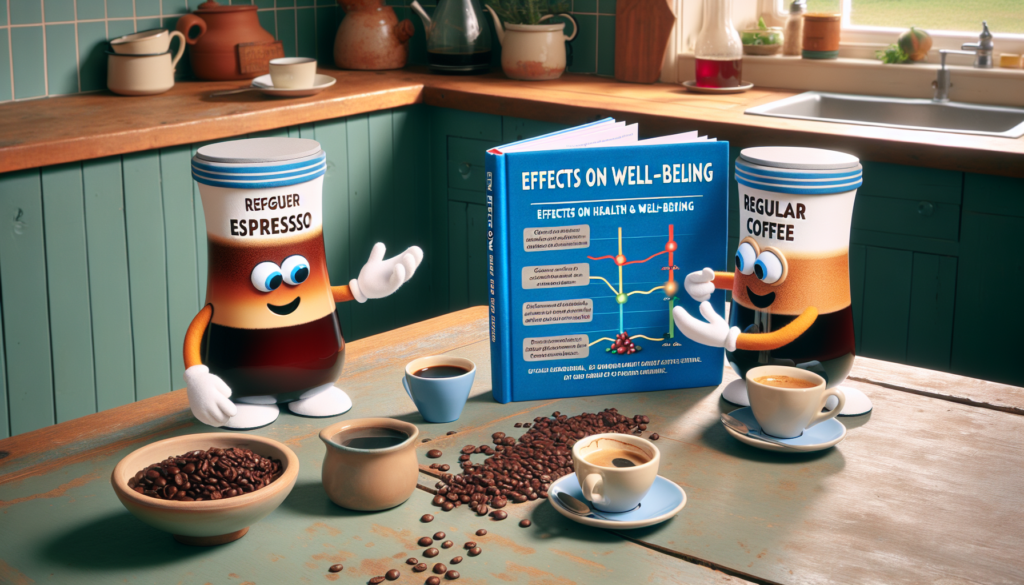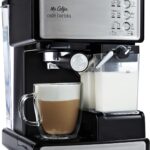
So you’ve probably heard about the ongoing debate between coffee-lovers: is espresso better for you than regular coffee? Well, it turns out that this seemingly innocent question has sparked quite the conversation among caffeine enthusiasts. Some argue that espresso is superior due to its stronger flavor and higher concentration of antioxidants, while others swear by traditional brewed coffee for its milder taste and longer-lasting effects. With conflicting opinions swirling around, it’s time to uncover the truth and discover whether your beloved espresso shot really has an edge over your cherished cup of joe.

Caffeine Content
Espresso has higher caffeine content than regular coffee
When it comes to caffeine content, espresso takes the lead over regular coffee. A single shot of espresso typically contains about 63 milligrams of caffeine, whereas a standard cup of coffee contains about 95 milligrams. This means that if you’re looking for that quick pick-me-up, espresso might be the way to go.
Espresso has more concentrated caffeine
One of the reasons why espresso packs such a punch is because it is more concentrated than regular coffee. The brewing process involved in making espresso involves forcing hot water through finely ground coffee beans, resulting in a small but potent shot of coffee. This concentrated form of caffeine can provide a quicker and more intense boost of energy compared to a regular cup of joe.
Different brewing methods affect caffeine levels
It’s important to note that while espresso generally has higher caffeine content, the brewing method used can also influence the caffeine levels. For example, a longer brewing time can extract more caffeine, so if you opt for a longer extraction time when making regular coffee, it could have a higher caffeine content compared to a standard espresso shot. Ultimately, the caffeine content can vary depending on the type of coffee beans, brewing method, and personal preference.
Health Benefits
Espresso may improve physical performance
If you’re an athlete or a fitness enthusiast, you might be pleased to know that espresso has been associated with improved physical performance. The caffeine in espresso has the ability to stimulate the central nervous system, leading to increased adrenaline production. This boost in adrenaline can enhance endurance, strength, and overall athletic performance.
Espresso contains more antioxidants than regular coffee
Antioxidants play a crucial role in protecting our bodies from oxidative stress and inflammation. Espresso, surprisingly, contains a higher concentration of antioxidants compared to regular coffee. These antioxidants, such as polyphenols and chlorogenic acids, are known to have various health benefits, including reducing the risk of chronic diseases like heart disease, diabetes, and certain types of cancer.
Espresso may reduce the risk of certain diseases
Along with its antioxidant properties, espresso has been associated with a reduced risk of certain diseases. Research suggests that regular consumption of espresso may lower the risk of developing conditions such as Parkinson’s disease, Alzheimer’s disease, and liver diseases, including liver cancer and cirrhosis. However, it’s important to remember that these findings are based on observational studies, and more research is needed to establish a causative link.
Digestion
Espresso is less acidic than regular coffee
For those with sensitive stomachs, espresso may be a better option than regular coffee. The brewing process of espresso typically results in a less acidic beverage compared to a cup of drip coffee. The lower acidity levels in espresso can help minimize the chances of heartburn or acid reflux, making it a gentler choice for those who are prone to digestive issues.
Espresso may be easier on the stomach
In addition to being less acidic, espresso is also known for being easier on the stomach. This is because espresso is brewed under high pressure, which extracts the oils and flavors from the coffee beans while leaving behind some of the compounds that can irritate the stomach lining. If you find that regular coffee upsets your stomach, switching to espresso might be a more comfortable choice.
Espresso may help with digestion
Interestingly, espresso has also been found to have potential benefits for digestion. The caffeine in espresso can act as a stimulant for the digestive system, increasing the production of gastric acids and enzymes that aid in the breakdown and digestion of food. This can potentially improve digestion and alleviate symptoms like bloating and constipation.
Heart Health
Espresso may have potential heart benefits
The relationship between espresso and heart health is an area of ongoing research. Some studies suggest that the antioxidants found in espresso, such as polyphenols, may have protective effects on the cardiovascular system by reducing inflammation and improving blood vessel function. These potential benefits could contribute to a healthier heart.
Espresso may help lower the risk of heart disease
Several studies have indicated that regular coffee consumption, including espresso, may be associated with a lower risk of developing heart disease. The mechanisms behind this potential protective effect are still being investigated, but it is believed that the antioxidants and other bioactive compounds present in espresso could play a role in reducing the risk of cardiovascular events.
Regular coffee consumption has mixed effects on heart health
While espresso might have potential heart benefits, it’s important to note that the effects of coffee consumption on heart health can vary depending on individual factors and overall lifestyle. Some studies have shown that excessive coffee consumption, particularly when combined with high levels of unfiltered coffee consumption (such as in French press coffee), may have negative effects on cardiovascular health. Moderation and personal health considerations should always be taken into account.

Weight Management
Espresso may help with weight loss
If you’re watching your weight, espresso may be a beneficial addition to your routine. The caffeine in espresso has been shown to have thermogenic properties, meaning it can increase your metabolic rate and the number of calories burned during digestion. This metabolic boost can potentially aid in weight loss efforts when combined with a healthy diet and regular exercise.
Espresso is lower in calories than some coffee drinks
In its pure form, espresso is a low-calorie beverage. A standard shot of espresso contains just a few calories, making it an excellent choice for those who are conscious of their caloric intake. However, it’s important to note that if you add milk, sugar, or other flavorings to your espresso, the calorie count can increase significantly. Opting for black espresso or using low-calorie alternatives can help you keep your coffee drinks on the lighter side.
Espresso may help boost metabolism
In addition to its potential weight loss benefits, espresso may also help boost your metabolism. The caffeine content in espresso stimulates the nervous system, which can increase your metabolic rate and help you burn more calories throughout the day. However, it’s important to remember that any metabolic boosting effects are temporary, and a balanced diet and regular physical activity are key for long-term weight management.
Mental Health
Espresso may enhance cognitive function
If you’re looking to give your brain a little boost, espresso might be just what you need. The caffeine in espresso can improve cognitive function by blocking adenosine receptors in the brain. This action leads to increased alertness, improved concentration, and enhanced memory retention. However, individual responses to caffeine can vary, so it’s essential to find the right balance that works for you.
Espresso may reduce the risk of depression
Studies have shown that regular coffee consumption, including espresso, may be associated with a reduced risk of developing depression. The reasons behind this association are not yet fully understood, but it is believed that the synergistic effects of caffeine and other bioactive compounds in coffee could have mood-enhancing properties. It’s worth noting that excessive caffeine consumption can have negative effects on mental health, so moderation is key.
Espresso may improve mood and alertness
In addition to its cognitive benefits, espresso has also been linked to improved mood and increased alertness. The combination of caffeine and other phytochemicals found in espresso can have a positive impact on neurotransmitters in the brain, leading to feelings of well-being and increased mental energy. Enjoying a shot of espresso can be a great way to start your day on a positive note.
Variety of Options
Espresso offers a variety of flavors and options
Espresso lovers can rejoice in the abundance of variety that this beverage offers. From bold and intense flavors to more delicate and nuanced profiles, espresso can cater to a wide range of taste preferences. You can experiment with different types of coffee beans, roast levels, and brewing techniques to create your perfect espresso experience.
Regular coffee can also provide a range of choices
While espresso may have its own unique offerings, regular coffee is also not short on variety. With a plethora of coffee beans, flavorings, and brewing methods available, you can customize your regular coffee to suit your taste buds. Whether you prefer a light-bodied pour-over, a rich French press, or a smooth cold brew, there’s a coffee out there that’s perfect for you.
Different brewing methods can affect taste
The brewing method you choose can greatly impact the taste of your coffee, whether it’s espresso or regular coffee. Espresso, with its unique brewing process, tends to have a concentrated and robust flavor profile. On the other hand, regular coffee prepared using methods like pour-over or French press can offer a more nuanced and subtle taste experience. Exploring different brewing methods can open up a world of flavors for you to enjoy.
Acidity Levels
Espresso is less acidic than drip coffee
If you’ve ever experienced acid reflux or stomach discomfort after drinking coffee, you might find relief in espresso. The brewing process of espresso results in a lower acidity level compared to drip coffee. This lower acidity can be gentler on the digestive system and may reduce the chances of experiencing discomfort. However, individual tolerance and sensitivity to acidity can vary, so it’s important to listen to your body.
Espresso may be gentler on the teeth
Acidic beverages can contribute to tooth enamel erosion and dental sensitivity. In this regard, espresso might have an advantage over drip coffee. The lower acidity of espresso can be less harmful to your tooth enamel, helping to preserve the health of your teeth. However, it’s still important to practice good oral hygiene and limit the consumption of acidic beverages to maintain optimal dental health.
Regular coffee can be highly acidic
While espresso may be a more tooth-friendly option, it’s worth noting that regular coffee can be highly acidic, especially when it’s brewed using certain methods or with darker roast beans. Acidic coffee can contribute to enamel erosion, tooth staining, and even gum irritation in some individuals. If you’re concerned about your dental health, it may be worth considering espresso as a potential alternative.
Potential Side Effects
Espresso can cause jitters and anxiety in some individuals
Although espresso can provide a much-needed energy boost, it can also have some unwanted side effects for some individuals. The high caffeine content in espresso can cause jitters, restlessness, and even anxiety, especially if consumed in excessive amounts or if you’re particularly sensitive to caffeine. If you experience these symptoms, it may be best to limit your espresso intake or opt for decaffeinated options.
Espresso may disrupt sleep patterns
If you enjoy a late afternoon or evening espresso, it’s important to be aware of its potential impact on your sleep patterns. The stimulating effects of caffeine can disrupt your natural sleep-wake cycle, making it harder for you to fall asleep or achieve deep, restful sleep. It’s generally recommended to avoid consuming espresso or any caffeinated beverages within a few hours of bedtime to ensure a good night’s sleep.
Regular coffee can contribute to caffeine addiction
Regular consumption of any caffeinated beverage, including espresso, can potentially lead to caffeine addiction. This happens when your body becomes dependent on caffeine to function properly, and withdrawal symptoms occur when you try to reduce or eliminate your caffeine intake. It’s important to be mindful of your caffeine consumption and consider moderation or occasional breaks to prevent dependence.
Serving Size
Espresso is typically consumed in smaller quantities
One notable difference between espresso and regular coffee is the serving size. Espresso shots are typically served in small, concentrated quantities, ranging from 1 to 2 fluid ounces. The small serving size allows you to enjoy the intense flavors of espresso without consuming a large volume of liquid.
Regular coffee is often consumed in larger servings
Compared to espresso, regular coffee is often consumed in larger servings. A typical cup of coffee can range from 8 to 12 fluid ounces, providing a more substantial beverage to enjoy. This larger serving size can be appealing to those who prefer a larger quantity of coffee or who like to savor their coffee over a longer period.
Espresso shots can be diluted with milk or water
If you find the concentrated nature of espresso a bit overwhelming, fear not! Espresso shots can be diluted with milk or water to create various espresso-based drinks such as lattes, cappuccinos, and Americanos. These diluted versions provide a milder taste and larger volume without sacrificing the essence of espresso. It’s all about finding the balance that suits your palate and preferences.
In conclusion, both espresso and regular coffee have their own unique characteristics and potential benefits. Espresso, with its higher caffeine content and concentrated nature, can offer a quick energy boost and a range of potential health benefits. It may be gentler on the stomach and teeth, aid in digestion, and provide mental health benefits. Regular coffee, on the other hand, can offer a wider variety of flavors and brewing methods, and depending on the type and preparation, it too can have health benefits. It’s essential to consider your personal preferences, health considerations, and moderation when deciding which coffee is better for you. Whether you’re an espresso aficionado or a fan of regular coffee, there’s no denying the pleasure and enjoyment that a good cup of coffee can bring. So savor your coffee, savor the moment, and let it be a part of your daily rituals.






